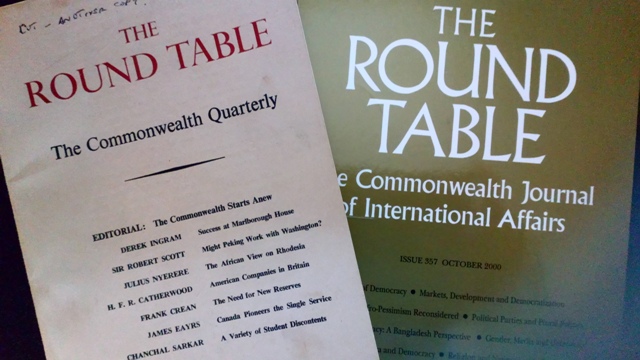
[These two excerpts are from a 2005 article currently available under The Round Table’s free-to-access project. Labour came to power under Tony Blair in 1997, promising to re-set Britain’s relationship with the rest of the Commonwealth after the difficult years under Margaret Thatcher and John Major. In this article, Paul D. Williams suggests that the fanfare and solemn declarations failed to translate into concrete actions, and that the official Commonwealth remains ‘an institution relegated to the back burner’. This article is fully available until 6 August, 2024. For other free-to-access articles, visit the front page of the Round Table website.]
Upon entering office in May 1997 Tony Blair’s New Labour government wrote a new Mission Statement for the Foreign and Commonwealth Office (FCO). Among other things this promised “to strengthen the Commonwealth and to improve the prosperity of its members and co-operation between its members”. While such vague statements are impossible to measure with any precision, the FAC’s point about neglect could arguably still be made with some force today. Indeed, in November 2004, the Conservative leader, Michael Howard, made a similar point when he described the Commonwealth as “a potential global resource” that was “enormously under used” (2004, p.3). But yet again, Howard, like the FAC before him, gave no specific indication of how this situation might be remedied.
Despite the government’s stated intention to strengthen the Commonwealth, the organization is clearly not a priority for UK foreign-policy makers. Although the UK currently pays some 30% of the Commonwealth Secretariat’s expenses, in absolute terms the figures are small (FCO, Citation2004, p. 181). The FCO’s website, for instance, declares that in 2002–03 it spent just under £4.3 million on the Commonwealth institutions out of its total public expenditure of £1526 million (FCO, Citation2004, p. 176). Nor is much space devoted to the Commonwealth in the most important recent documents setting out the UK’s foreign policy priorities. For example, the Commonwealth did not merit a mention in either the government’s strategic response to the terrorist attacks of 11 September 2001—set out in Defeating International Terrorism: Campaign Objectives (released on the Ministry of Defence’s (MOD) website on 16 October 2001)—or in the 2003 defence White Paper, Delivering Security in a Changing World. Similarly, the Commonwealth received only one cursory reference as an instrument for spreading the English language in the Department of Trade and Industry’s latest White Paper, Making Globalization a Force for Good, published in July 2004. It got no mention at all in the supporting essays entitled ‘Liberalization and globalization: maximizing the benefits of international trade and investment’. Finally, the sole reference to the Commonwealth in the FCO’s strategy document, UK International Priorities (2003, p.25), vaguely suggested it would “remain a valuable informal group for the promotion of common values and interests across the world”. The Commonwealth, in short, is not high on the UK’s current list of foreign policy priorities.
About the ‘From the archives’ project
2005: Blair’s Britain and the Commonwealth
1997: Britain’s New Labour government and the Commonwealth
Conclusions
As this brief overview attests, the Commonwealths—both official and unofficial—have contributed to Labour’s foreign policies on questions of security, development and governance. But it remains fair to say that the official Commonwealth is still “an institution relegated to the back burner”. Part of the reason for this is that the organization lacks a mechanism for ensuring that its members live up to their stated principles and values. The official Commonwealth’s failure to take a rapid, tough and united stand in response to Zimbabwe’s crisis was evidently a source of significant frustration for Blair’s government. It also strengthened the position of the cynics and those who argue that a Commonwealth-with-teeth is unlikely to develop in the foreseeable future. Another factor that helps explain the UK’s relative neglect of the Commonwealth is their somewhat diverging agendas. Whereas the Commonwealth has arguably become “the world’s premier forum for small states” (CitationMcIntyre, 2001, p.3), the FCO’s most recent strategy document clearly indicates that the UK is more concerned with building partnerships with the world’s pivotal states, especially the USA, China, Russia, Japan and India.
Where agendas diverge, neglecting the Commonwealth may make sense. But there is no excuse for ignoring the organization when there is a conspicuous convergence of agendas. Here, perhaps the most important example is the ongoing ‘war on terror’ and the UK’s stated priority of encouraging reform in the Arab world. This is an issue that cuts across all the sectors of security, development and governance. Yet in a major speech about building partnerships to encourage reform in the Arab world, the Foreign Secretary, Jack Straw, made no mention of the Commonwealth (2004). Nor does the FCO’s website identify a role for the Commonwealth as part of the UK’s multilateral approach to combating the threat of international terrorism. Given that some 500 million Muslims live in Commonwealth states it is surprising that Blair’s government has not made more use of the organization as a forum for debating strategies about this crucial issue, especially since the USA is not a Commonwealth member. Similarly, the UK could make better use of the Commonwealth as a barometer of the opinions of Southern states more generally, given the significant overlap between the memberships of the Commonwealth, Non-Aligned Movement and G-77. As 9/11 dramatically demonstrated, these issues are too important for the UK not to fully utilize every foreign policy instrument at its disposal.
The writer is Paul D Williams.
The ‘From the archives’ project is curated by Dr Alex May and Paul Flather.



